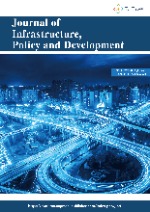|
|
|
Recently Published Issue
Vol 9, No 4 (2025)
Table of Contents
Announcements
Notice on the change of publication fees since May 1, 2025 |
|
From May 1 2025 onwards, the Article Processing Charge (APC) for new submissions to the journal will be revised to $500. The previous APC policy of $1800 will remain in effect for submissions made prior to this date. For more details, please find it on the publicaiton fees policy. |
|
| Posted: 2025-04-10 | More... |
Important Announcement Regarding Scopus Indexing of JIPD |
|
We would like to inform you that, as of 17 January 2025, JIPD will no longer be indexed in Scopus. Although JIPD is no longer indexed by Scopus, this change does not reflect any decline in the quality of the research published or our dedication to supporting scholarly communication. We will continue to offer an open platform for original, impactful research across infrastructure, economic development, and public policy. We understand the importance of indexing for the visibility and impact of research, and we are actively pursuing other avenues to enhance the accessibility and influence of the work published in JIPD. Our commitment to rigorous peer-review processes, high-quality publications, and timely dissemination of research remains unchanged. We deeply value your support and trust over the years, and we encourage you to continue submitting your valuable research to JIPD. Your contributions help us continue our mission of fostering academic dialogue and advancing knowledge in this field. Thank you for your ongoing dedication to JIPD. Together, we can continue to make a positive impact on the academic community. |
|
| Posted: 2025-01-20 | |
Manuscript Quality Check Process |
|
| To maintain the high standards of Infrastructure, Policy and Development, we have invited a team of academic editors who perform quality checks at every stage of the manuscript process. This ensures that every submission meets the journal's stringent requirements. For manuscripts that do not meet these standards, the team will make constructive suggestions for revisions, and publication will not occur until they meet the journal's quality standards. |
|
| Posted: 2024-11-14 | |
| More Announcements... |








 ISSN:
ISSN: Open Access
Open Access
